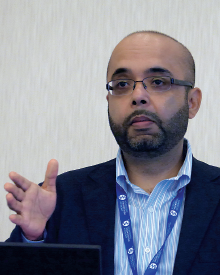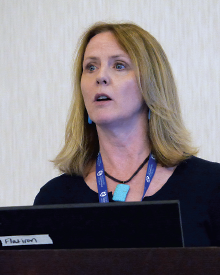Fellowship Connects Psychiatrists With Patients in Underserved Regions
Abstract
The University of Pittsburgh responds to unmet psychiatric needs in rural Pennsylvania with outreach and a successful fellowship program.
Bringing psychiatry to rural areas has never been easy or simple, but one team has created a way to link its academic medical center in Pittsburgh with patients living in more rural regions of the state.
“We cover a wide area but we all belong to the same practice,” Kenneth Nash, M.D., M.M.M., chief of clinical affairs at the Western Psychiatric Institute and Clinic (WPIC) of the University of Pittsburgh Medical Center, told an audience at last month at IPS: The Mental Health Services Conference.
In addition to 310 beds at WPIC, the network includes six inpatient sites with a total of 500 beds across western Pennsylvania. Through the use of telepsychiatry, the group connects to eight additional clinics located 70 to 250 miles from Pittsburgh, said Nash. A rotating group of 10 psychiatrists also spend about 62 hours weekly connecting with about 80 patients via the telehealth system. This includes some combination of 60- to 90-minute evaluations and 15- to 30-minute follow-up sessions.

Working with patients in rural areas can create new opportunities for personal growth and systems innovation, says Manish Sapra, M.D., M.M.M., an assistant professor of psychiatry at the University of Pittsburgh School of Medicine.
There are plenty of challenges for both patients and clinicians in rural areas, said Manish Sapra, M.D., M.M.M., an assistant professor of psychiatry and senior director of community and public service psychiatry at the University of Pittsburgh School of Medicine.
Rural areas are often poor and face shortages of all kinds of health resources, including options for mental health care. The distance between patients and the closest clinics or hospitals can be great. Additionally, the stigma associated with mental illness combined with concerns about seeking care in a place where people all seem to know each other can keep those in need from seeking treatment.
According to Sapra, psychiatrists in rural areas may face lower salaries, isolation from their peers, and faster burnout.
Despite these challenges, Sapra said that working in rural areas can create new opportunities for personal growth and systems innovation. He noted that many of the changes now being encouraged in psychiatric care are already present to some degree in rural psychiatry: services integrated with primary care, telehealth, and school- or home-based interventions.
To encourage psychiatry residents to consider a career in rural psychiatry, WPIC created the Rural Public Psychiatry Fellowship, based at the Lake Erie College of Osteopathic Medicine in Erie, Pa. (WPIC also offers a second fellowship in public service psychiatry, which also provides some experience in rural clinical settings.)
“Psychiatry residents are well trained in inpatient care and medication management but less so in community psychiatry,” said Penny Chapman, M.D., a clinical assistant professor of psychiatry at WPIC and medical director of Stairways Behavioral Health.

Penny Chapman, M.D., a clinical assistant professor of psychiatry at Western Psychiatric Institute and Clinic, says the school’s Rural Public Psychiatry Fellowship is helping to bridge the gap in psychiatric care in western Pennsylvania.
The rural fellowship, co-directed by Chapman and Sapra, gives new psychiatrists the opportunity to gain subspecialty training with senior psychiatrists in fields such as geriatrics and substance abuse. Fellows receive a full attending’s salary as well as one day off per week to complete their fellowship requirements. Academic opportunities include biweekly webinars and the opportunity to present research at WPIC’s annual conference on rural psychiatry.
Over the eight years since the fellowship was established, fellows have worked with patients at a federally qualified health center as well as a clinic for women just released from a local jail. The fellows have also trained rural primary care physicians and developed a program to educate families of people with mental illness about how best to manage the care of those with a mental disorder.
“We have trained six fellows so far, and they have all stayed in Pennsylvania and are doing community psychiatry,” said Chapman.
The current fellow, Joseph Holmes, D.O., who grew up in rural West Virginia, appreciates the clinically focused fellowship.
“I’m getting the opportunity to develop a system to provide care for people who have no care,” he said. ■
More about the Rural Public Psychiatry Fellowship of the Western Psychiatric Institute and Clinic can be accessed here.



